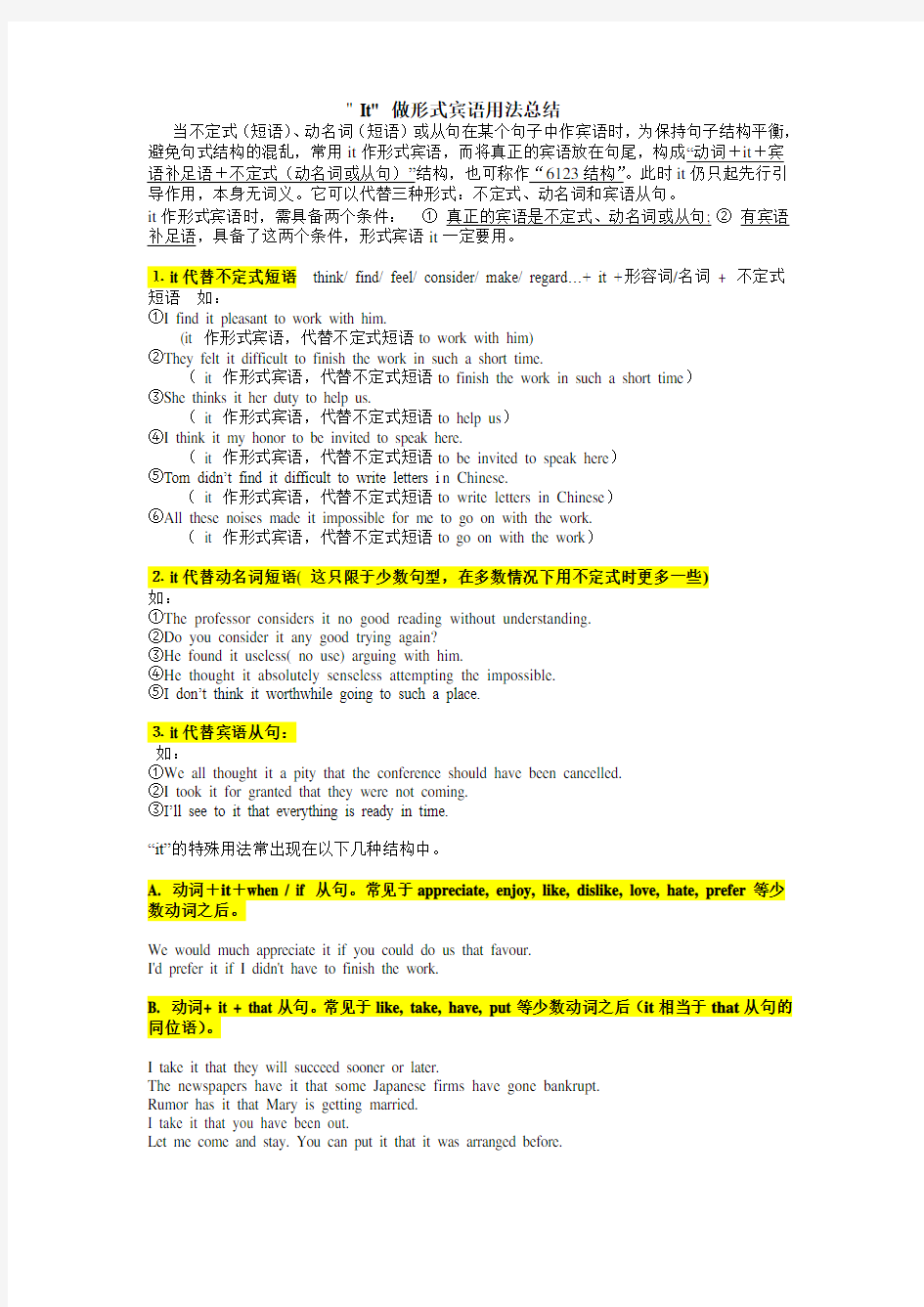
(完整word版)It作形式宾语用法总结
- 格式:doc
- 大小:36.51 KB
- 文档页数:2


" It" 做形式宾语用法总结
当不定式(短语)、动名词(短语)或从句在某个句子中作宾语时,为保持句子结构平衡,避免句式结构的混乱,常用it作形式宾语,而将真正的宾语放在句尾,构成“动词+it+宾语补足语+不定式(动名词或从句)”结构,也可称作“6123结构”。此时it仍只起先行引导作用,本身无词义。它可以代替三种形式:不定式、动名词和宾语从句。
it作形式宾语时,需具备两个条件:①真正的宾语是不定式、动名词或从句; ②有宾语补足语,具备了这两个条件,形式宾语it一定要用。
⒈ it代替不定式短语think/ find/ feel/ consider/ make/ regard…+ it +形容词/名词+ 不定式短语如:
①I find it pleasant to work with him.
(it 作形式宾语,代替不定式短语to work with him)
②They felt it difficult to finish the work in such a short time.
(it 作形式宾语,代替不定式短语to finish the work in such a short time)
③She thinks it her duty to help us.
(it 作形式宾语,代替不定式短语to help us)
④I think it my honor to be invited to speak here.
(it 作形式宾语,代替不定式短语to be invited to speak here)
⑤Tom didn’t find it difficult to write letters i n Chinese.
(it 作形式宾语,代替不定式短语to write letters in Chinese)
⑥All these noises made it impossible for me to go on with the work.
(it 作形式宾语,代替不定式短语to go on with the work)
⒉ it代替动名词短语( 这只限于少数句型,在多数情况下用不定式时更多一些)
如:
①The professor considers it no good reading without understanding.
②Do you consider it any good trying again?
③He found it useless( no use) arguing with him.
④He thought it absolutely senseless attempting the impossible.
⑤I don’t think it worthwhile going to such a place.
⒊ it代替宾语从句:
如:
①We all thought it a pity that the conference should have been cancelled.
②I took it for granted that they were not coming.
③I’ll see to it that everything is ready in time.
“it”的特殊用法常出现在以下几种结构中。
A. 动词+it+when / if 从句。常见于appreciate, enjoy, like, dislike, love, hate, prefer等少数动词之后。
We would much appreciate it if you could do us that favour.
I'd prefer it if I didn't have to finish the work.
B. 动词+ it + that从句。常见于like, take, have, put等少数动词之后(it相当于that从句的同位语)。
I take it that they will succeed sooner or later.
The newspapers have it that some Japanese firms have gone bankrupt.
Rumor has it that Mary is getting married.
I take it that you have been out.
Let me come and stay. You can put it that it was arranged before.
C. 动词+ it + 介词短语+ that从句。常见于bring it to one's attention; owe it to sb; take it for granted 等结构中。
I owe it to you that I finished my work in time.
Don't take it for granted that they will support you.
D. 动词+ 介词(短语) + it + that从句。常见于answer for, depend on, rely on, insist on, look to, see to, stick to 等结构中。
I'll see to it that everything is ready in time.
You may depend on it that Tom will help you with your English.
I’m counting on it that you will come.
E. 动词+ it +过去分词+从句。常见于几个可以带过去分词作宾语补足语的动词之后。
I heard it said that that factory was founded in 1995.
They haven't made it known where the meeting is to take place.
易混用其他句型
英语中有一些句型不含it, 但却易被误用了it,常见的有以下句型:
⒈ There is something/nothing wrong/ the matter with sb./ sth.
如:There is nothing wrong /the matter with him. He’s just pretending.他没什么事,他只是在装呢。
⒉There is no doubt about…对…毫不怀疑
There is no doubt that…对…毫不怀疑
如:①There is no doubt about his suitability for the job.毫无疑问,他适合这个工作。
②There is no doubt about the fact.关于这个事实毫无怀疑。
③There is no doubt that he is hard to deal with.毫无置疑他很难对付。
⒊ There is no need (for sb.) to do sth.没必要…
如:①There was no need for him to remain in Paris.他没有必要继续留在巴黎。
②There is no need for you to start yet.你现在还不必动身。
⒋There is no/a possibility that… …没可能/有可能
(= It is impossible/possible that …)
如:①There is a possibility that the train may be late.可能火车要晚点。
②There is no possibility that we’ll see him this weekend.我们本周末不可能见到他。
⒌There is a chance that …可能…
如:There is a chance that the sick child will get well.这个生病的孩子可能会好起来的。
⒍There be no/ some differences between…and……和…之间没/有区别
如:There are some differences between the two languages.这两种语言之间有些区别。
⒎ After what seemed + 时间
如:After what seemed a very long time, the wounded soldier came back to life.
在经过似乎很长的一段时间之后,那个受伤的士兵苏醒了过来。
⒏ There be difficulty/ trouble (in) doing sth.干…有困难
如:There was no difficulty in finding him.找到他没费什么事。